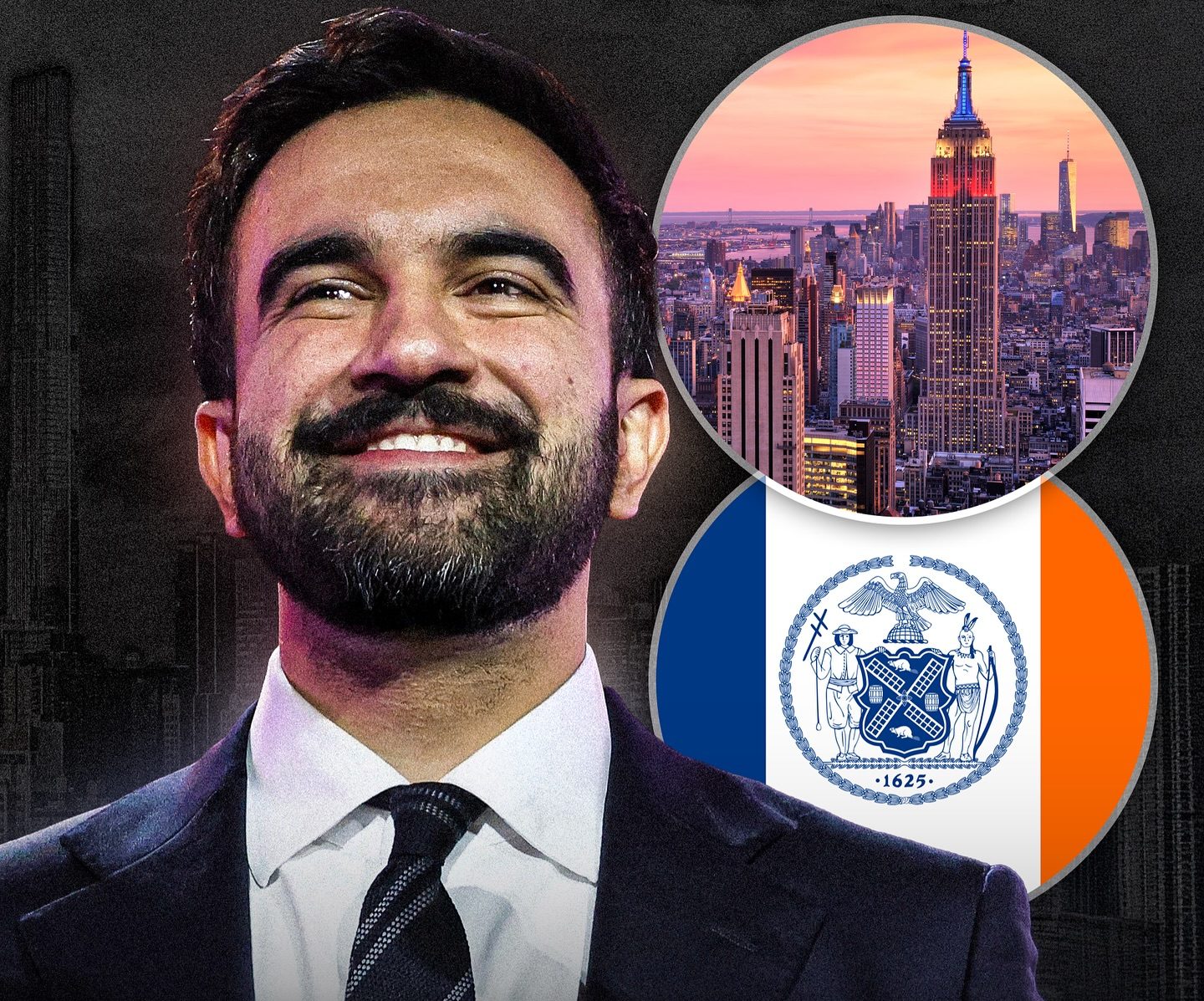Zohran Mamdani Just Made History: At 34 He’s NYC’s Youngest Mayor in Over a Century — and the City’s First Muslim Mayor
When I first saw the image of Zohran Mamdani standing under the lights, smiling with a quiet, almost surprised joy, I felt the small, hot rush of something that looks an awful lot like hope. This wasn’t just another election night photo; it was a doorway. The headline said it plainly: Mamdani won. The facts landed the way a bell rings — sharp, impossible to ignore. At 34, he’ll be the youngest mayor New York City has seen in more than a century, and he’ll be its first Muslim mayor. For a city stitched together from neighborhoods and languages, from countless arrivals and midnight shifts, the win felt like a mirror held up to its own story. This article walks through those moments and what they meant — using the images that captured his night and the lines he spoke that will keep echoing.
“A city built by immigrants, powered by immigrants, and now led by an immigrant.”
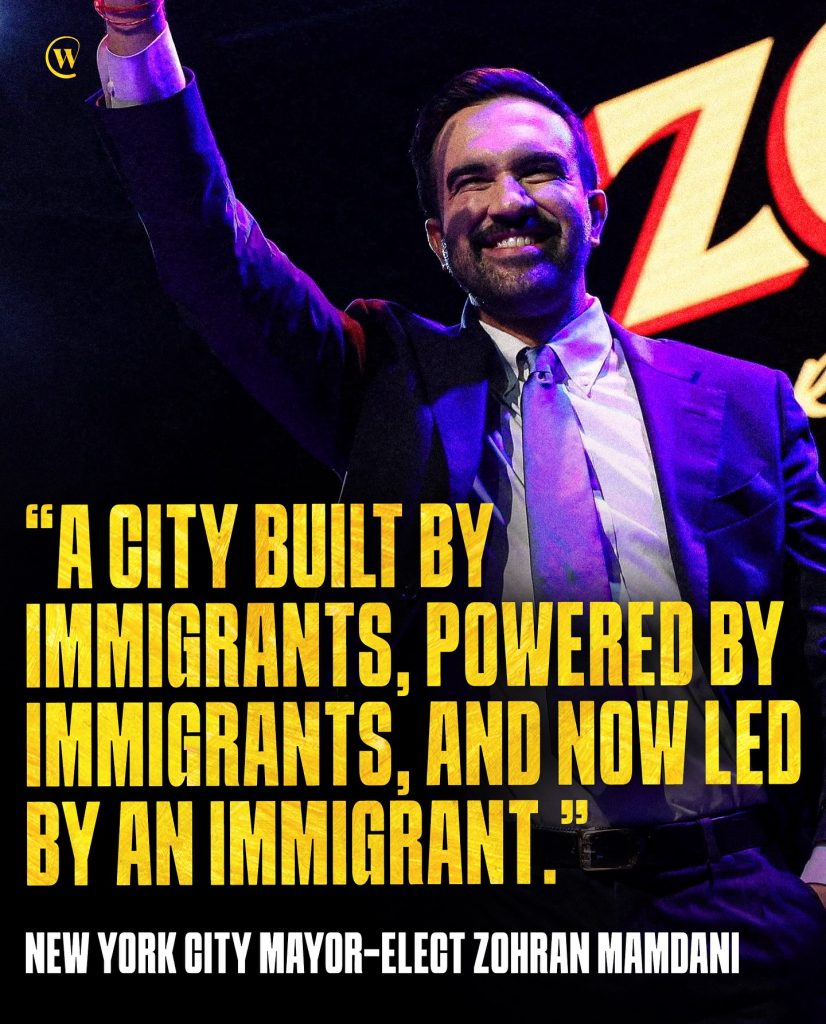
He said it plainly on stage, and the words landed the way a promise should — with clarity and conviction. Those lines cut across campaign rhetoric and TV noise because they were true in the simplest, most stubborn sense. New York is, at its core, a patchwork of people who came to make something better for themselves and their families. To hear him claim that identity publicly — to stake leadership on it — was also to remind the city of itself. It wasn’t a boast. It wasn’t a provocation. It was recognition: of laborers, of caretakers, of restaurant owners and laundromat clerks, of parents who worked double shifts so children could take music classes. That line was both a nod to history and a direct challenge to those who would reduce New York’s story to fear. Standing there, Mamdani framed his victory as more than personal triumph; he wrapped it around the city’s long, collective labor.
“Donald Trump, since I know you’re watching, I have four words for you: Turn the volume up.”
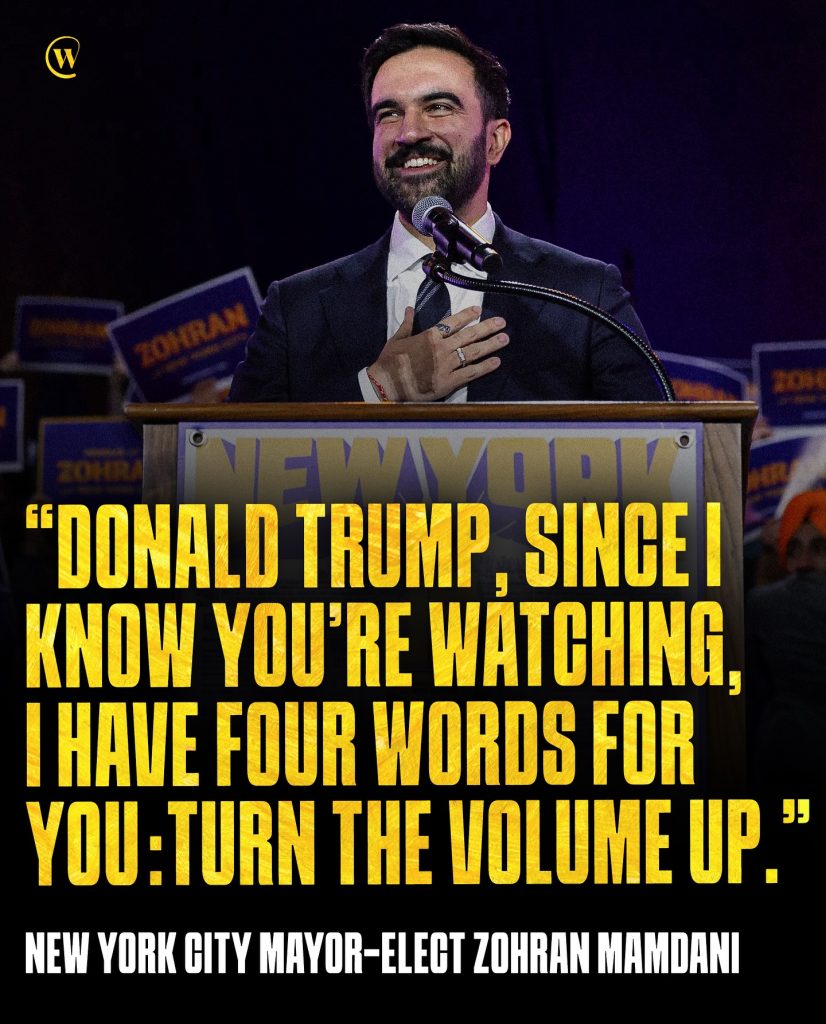
There were a few moments in the speech that were playful, even theatrical — this line among them. It had bite and humor, a wink thrown toward an audience that follows national fights about identity every day. But beneath the quip was a posture: unafraid, irreverent, and unapologetically New York. It was the kind of line that signals a new mayor isn’t going to shrink from national scrutiny, but also won’t be intimidated by it. It’s a bracing mix — a politician who can be both earnest and willing to throw a punchline when the moment calls for it. The crowd’s laughter and applause in those images showed relief: politics can still be human, even sharp, and sometimes that’s what a city leader needs to be.
“I am Muslim. I am a Democratic Socialist.”
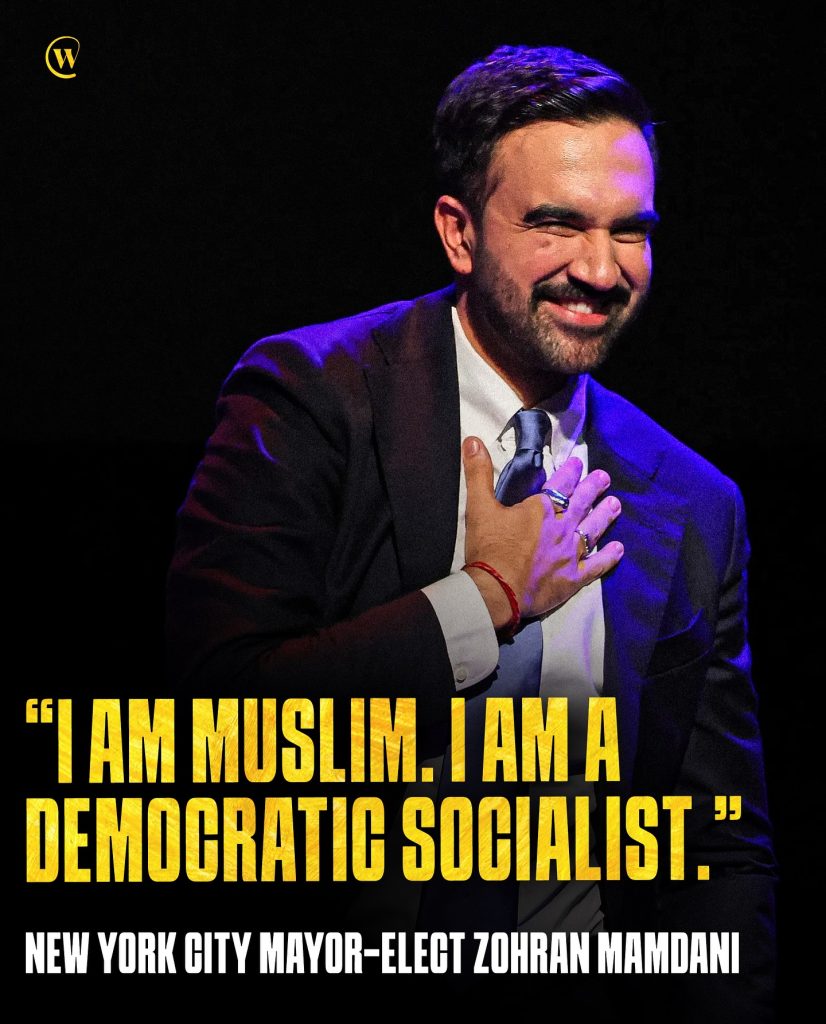
Identity is rarely one neat label, and Mamdani spoke to that complexity openly. He embraced both labels — religious and political — in a single breath, as if to show the world that layered identities were not contradictions but commitments. That declaration did more than map his beliefs; it tested an old script about what a mayor “looks like” or “sounds like.” In a country where religion and ideology can be reduced to caricature, moments like this are defiant and tender. For people who have rarely seen themselves in seats of power, it was an affirmation: leadership can look like your neighbor, your friend, your kid’s teacher. It’s a quiet revolution to watch someone say their whole truth in public and have that truth accepted by voters.
“Tonight we have spoken in a clear voice: hope is alive.”
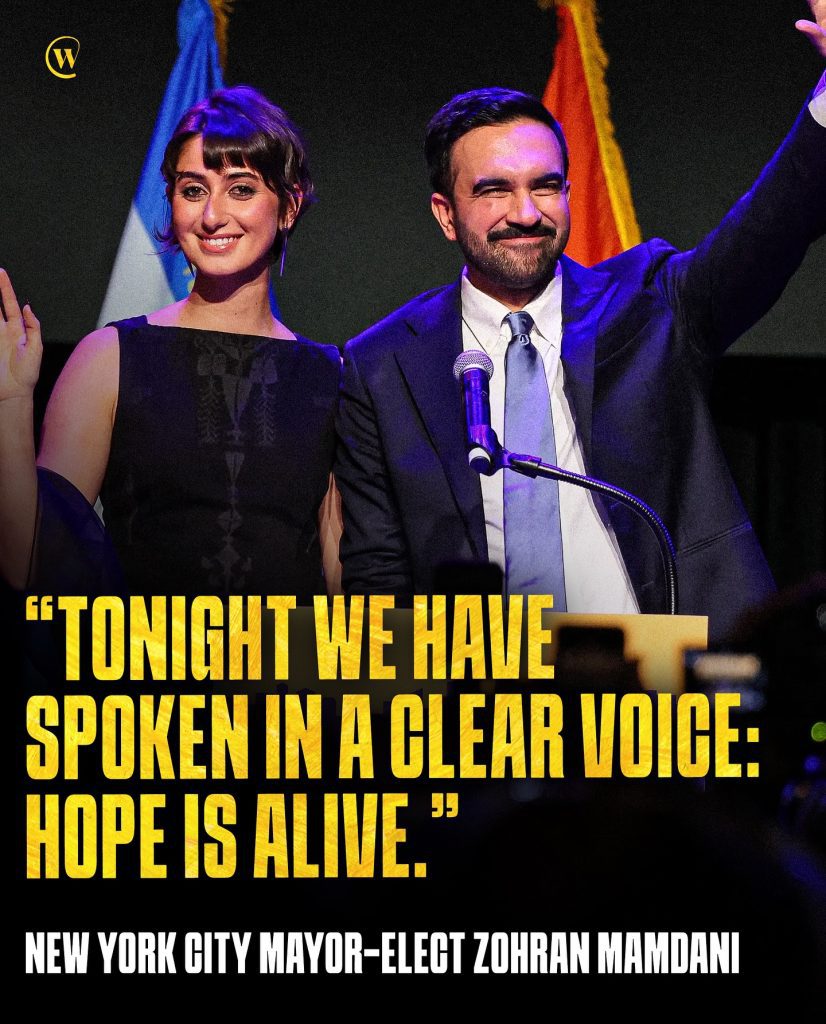
One of the images I keep returning to is the one where he stands with someone at his side, both waving, both glowing. The caption that reads “hope is alive” feels less like a campaign line and more like a pulse check. After years of noise, polarization, and headlines that often highlight what divides us, there was something oddly calming about hearing someone call for hope. It’s a humble phrase, but when an entire city replies to that phrasing by choosing that leader, it becomes louder than rhetoric. In that moment, the city’s vote felt like an answer: we are tired of fear as policy. We want a future that actually names possibility.
“In this moment of political darkness, New York will be the light.”
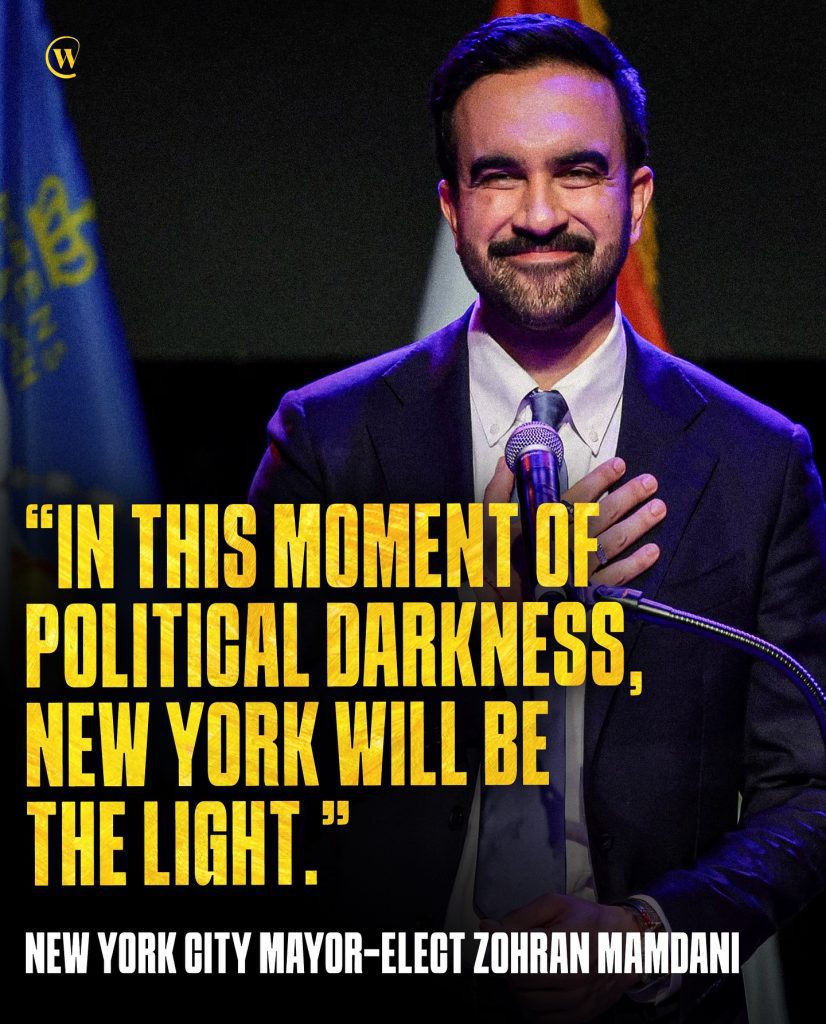
Political language can be florid, but every once in a while a sentence comes that lands and holds. Saying New York would be “the light” during “political darkness” was both aspirational and unapologetic. It acknowledged that people—across politics and neighborhoods—feel anxious and uncertain. But it also placed the burden of response squarely on leadership: to act, to heal, to be an example. If you look at the picture of Mamdani speaking those lines, you can see the weight of that responsibility sitting softly on his shoulders. It is one thing to run on change; it is another to accept the mantle of being the example for that change when the confetti falls.
In his victory speech, he spoke about what it really means
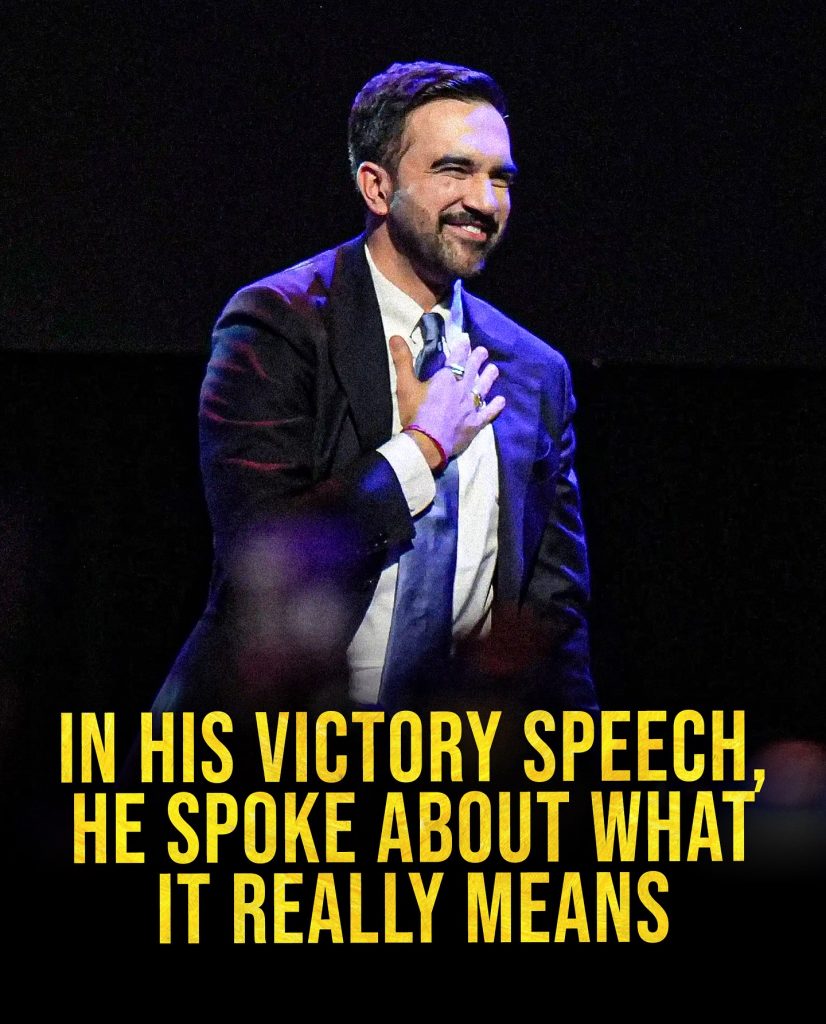
The final image that anchors this story is the one where he places his hand over his heart — an old gesture that somehow read as new again. In his speech he didn’t just celebrate; he explained. He explained what this victory meant for neighborhoods that had long felt ignored, for working families, for people whose last names mark long migration stories. He told the city what they’d voted for: a leader who understands shifting economies, housing pressure, transit strain, and the quiet dignity of municipal services done right. But he also urged patience and partnership. Leadership is not a magic wand; it is steady work, meetings, compromises, nights hunched over budgets and mornings greeting school principals. The images captured both the joy of election night and the sober glance toward the work ahead.
Closing — what this night leaves behind
There’s a specific sound I keep replaying: the murmur of a crowd as a new mayor speaks. It’s not just applause; it’s the small noises people make when they decide together. The images you uploaded show that collective sound: faces in the crowd, signs held high, hands lifted for photos. This is what a city is — not a building or a skyline, but a stubborn set of voices that, together, make noise until someone answers. Zohran Mamdani’s victory is a single answer, but it’s also an invitation. He inherits a city of contradictions and grit, of cathedral spires and corner bodegas, of long commutes and short tempers. If the photos and the lines of his speech mean anything, they suggest he wants to lead with empathy and an ear for the city’s many, many voices. I don’t know how his tenure will unfold on every policy or budget line. What I do know is the picture of him, hand on heart, looking out at the crowd — that image is a small promise, and for a lot of New Yorkers, a long-awaited one.

